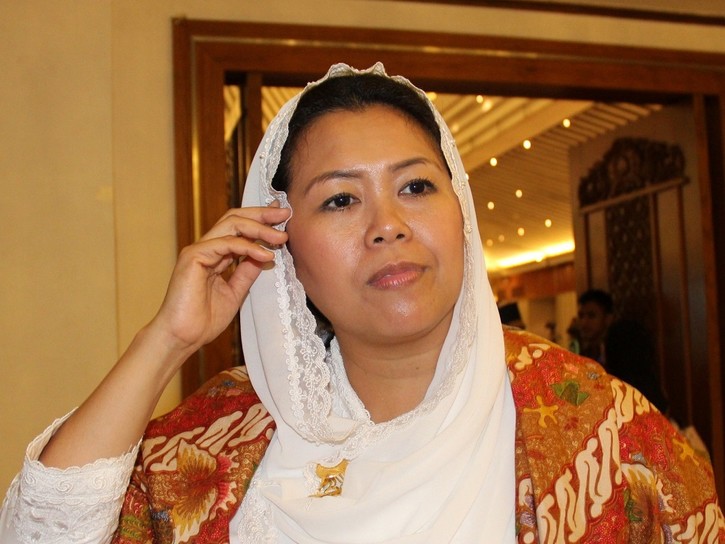by DUNCAN GRAHAM
 Yenny Wahid has become the face of the struggle for religious harmony in Indonesia PHOTO/Duncan Graham
Yenny Wahid has become the face of the struggle for religious harmony in Indonesia PHOTO/Duncan Graham
Yenny Wahid is the new face of moderate Islam
Yenny Wahid knows her place. It’s everywhere.
With the collapse of other contenders the second daughter of the late Abdurrahman Wahid (Gus Dur), the fourth president of Indonesia, has become the face of struggling religious harmony in the nation with the largest population of Muslims in the world.
It’s a role she seems to enjoy despite it ravaging her personal life. ‘Maybe not my fate but an obligation,’ she said while running late between public engagements. ‘I also need to work smarter and manage time better.’ This last hope lacked conviction.
In late April Wahid spoke to 1000 women splendidly dressed in batik sarongs and tight lace kebaya blouses at the Jakarta headquarters of the Japanese Buddhist movement Soka Gakkai.
Followers had gathered to honour Indonesia’s nineteenth century women’s rights advocate Raden Adjeng Kartini under the slogan ‘The World is Yours to Change’. Wahid was the keynote speaker. Although lionized she never looked prideful, wandering off the red carpet to chat to bystanders.
In her speech Wahid suggested deletion of the ‘Y’ in the slogan, though her smile diluted organisers’ embarrassment.
Her next stop was at a distant hotel to moderate a discussion. Here the gender imbalance was flipped. At the Kongres Ekonomi Umat (Muslim Economic Congress) elderly men ruled ten to one.
A speaker who complained of having insufficient cash to open a university because he had two wives drew titters of laughter. Wahid didn’t react. She preaches equality and respect but her approach to feminism avoids slapping down a misogynist among their mates.
The smile never subsides because everyone is the paparazzi ready to record a slip, but up close her hard brown eyes tell another story: controlled determination.
Wahid comes across as bright and polite, but she’s also firm and a little wary; she’s accompanied by an ‘adjutant’ who carries police ID but keeps his distance.
During his two five-year terms, former president Susilo Bambang Yudhoyono wore the moderate Muslim crown. He was welcomed in the West and sought after on the speaking circuit after his retirement in 2014.
SBY lost some of his lustre late last year when he waded into the political sewer in a failed attempt to get his oldest son Agus elected governor of Jakarta. He denied allegations of funding mobs to bully voters – but the stench stuck.
Another past claimant to the moderate-Islam coronet is Jakarta’s governor-elect Dr Anies Baswedan, former university rector and education minister celebrated for his Indonesia Mengajar project, which puts volunteer teachers into remote schools. Descriptors included ‘intellectual’ and ‘moderate’. The latter is now seldom heard.
The US-educated academic lost his aura this year when he teamed up with some of the more dubious players in the power game. Their goal was to defeat the ethnic Chinese Protestant governor of Jakarta Basuki Tjahaja (Ahok) Purnama at whatever cost; it seems Baswedan didn’t care that his side was using xenophobia and vile threats such as denying burial rites to Ahok voters.
His supporters included the Front Pembela Islam (Islamic Defenders Front, or FPI) who many see as a gang of vigilantes masquerading as pious Muslims, and failed presidential candidate Prabowo Subianto who helped bankroll Baswedan’s successful bid for the capital’s top job.
The departures of these men with feet of clay has left Zannuba Ariffah Chafsoh Rahman (Yenny) Wahid as the standout voice; her task is to explain that the national motto ‘Bhinneka Tunggal Ika’ (Unity in Diversity) applies to all Indonesians – even kafir (unbelievers).
Inside Indonesia for more
